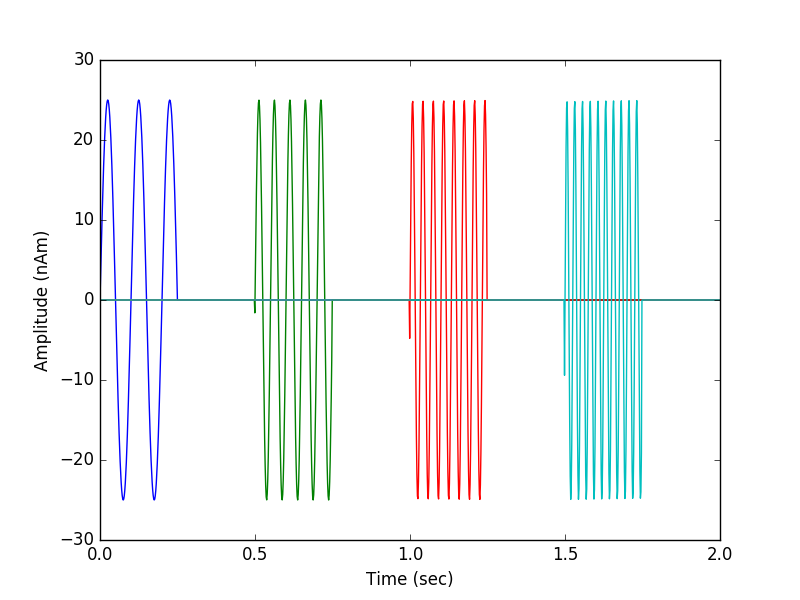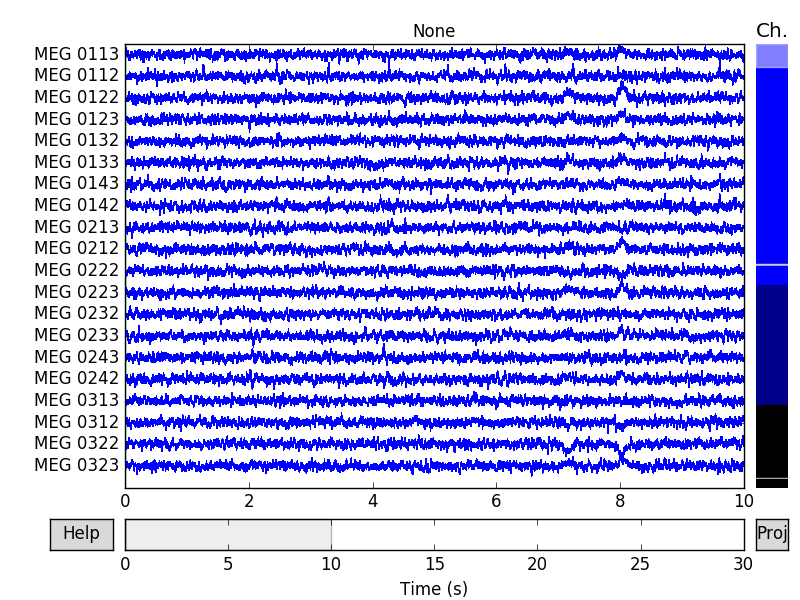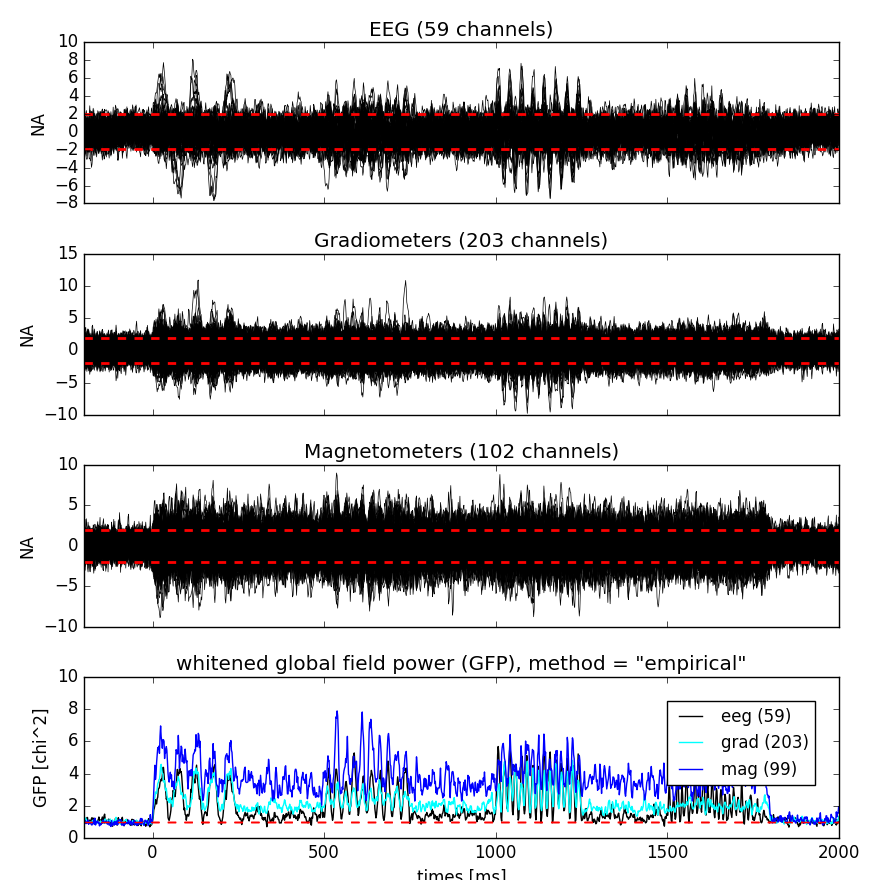This example generates raw data by repeating a desired source activation multiple times.
# Authors: Yousra Bekhti <yousra.bekhti@gmail.com>
# Mark Wronkiewicz <wronk.mark@gmail.com>
# Eric Larson <larson.eric.d@gmail.com>
#
# License: BSD (3-clause)
import numpy as np
import matplotlib.pyplot as plt
import mne
from mne import read_source_spaces, find_events, Epochs, compute_covariance
from mne.datasets import sample
from mne.simulation import simulate_sparse_stc, simulate_raw
print(__doc__)
data_path = sample.data_path()
raw_fname = data_path + '/MEG/sample/sample_audvis_raw.fif'
trans_fname = data_path + '/MEG/sample/sample_audvis_raw-trans.fif'
src_fname = data_path + '/subjects/sample/bem/sample-oct-6-src.fif'
bem_fname = (data_path +
'/subjects/sample/bem/sample-5120-5120-5120-bem-sol.fif')
# Load real data as the template
raw = mne.io.read_raw_fif(raw_fname)
raw = raw.crop(0., 30.) # 30 sec is enough
Out:
Opening raw data file /home/ubuntu/mne_data/MNE-sample-data/MEG/sample/sample_audvis_raw.fif...
Read a total of 3 projection items:
PCA-v1 (1 x 102) idle
PCA-v2 (1 x 102) idle
PCA-v3 (1 x 102) idle
Range : 25800 ... 192599 = 42.956 ... 320.670 secs
Ready.
Current compensation grade : 0
Generate dipole time series
n_dipoles = 4 # number of dipoles to create
epoch_duration = 2. # duration of each epoch/event
n = 0 # harmonic number
def data_fun(times):
"""Generate time-staggered sinusoids at harmonics of 10Hz"""
global n
n_samp = len(times)
window = np.zeros(n_samp)
start, stop = [int(ii * float(n_samp) / (2 * n_dipoles))
for ii in (2 * n, 2 * n + 1)]
window[start:stop] = 1.
n += 1
data = 25e-9 * np.sin(2. * np.pi * 10. * n * times)
data *= window
return data
times = raw.times[:int(raw.info['sfreq'] * epoch_duration)]
src = read_source_spaces(src_fname)
stc = simulate_sparse_stc(src, n_dipoles=n_dipoles, times=times,
data_fun=data_fun, random_state=0)
# look at our source data
fig, ax = plt.subplots(1)
ax.plot(times, 1e9 * stc.data.T)
ax.set(ylabel='Amplitude (nAm)', xlabel='Time (sec)')
fig.show()

Out:
Reading a source space...
Computing patch statistics...
Patch information added...
Distance information added...
[done]
Reading a source space...
Computing patch statistics...
Patch information added...
Distance information added...
[done]
2 source spaces read
Simulate raw data
raw_sim = simulate_raw(raw, stc, trans_fname, src, bem_fname, cov='simple',
iir_filter=[0.2, -0.2, 0.04], ecg=True, blink=True,
n_jobs=1, verbose=True)
raw_sim.plot()

Out:
Provided parameters will provide approximately 15 events
Setting up raw simulation: 1 position, "cos2" interpolation
Blinks simulated and trace stored on channel: EOG 061
ECG simulated and trace not stored
Event information stored on channel: STI 014
Setting up forward solutions
Computing gain matrix for transform #1/1
Simulating data for 0.000-30.001 sec with 16 events
Done
Plot evoked data
events = find_events(raw_sim) # only 1 pos, so event number == 1
epochs = Epochs(raw_sim, events, 1, -0.2, epoch_duration)
cov = compute_covariance(epochs, tmax=0., method='empirical') # quick calc
evoked = epochs.average()
evoked.plot_white(cov)

Out:
Removing orphaned offset at the beginning of the file.
15 events found
Events id: [1]
15 matching events found
Created an SSP operator (subspace dimension = 3)
3 projection items activated
Loading data for 15 events and 1322 original time points ...
1 bad epochs dropped
Too few samples (required : 1825 got : 1694), covariance estimate may be unreliable
Estimating covariance using EMPIRICAL
Done.
Using cross-validation to select the best estimator.
Number of samples used : 1694
[done]
log-likelihood on unseen data (descending order):
empirical: -2536.660
selecting best estimator: empirical
estimated rank (eeg): 59
estimated rank (grad): 203
estimated rank (mag): 99
estimated rank (mag + grad): 302
estimated rank (eeg): 59
Created an SSP operator (subspace dimension = 3)
Setting small MEG eigenvalues to zero.
Not doing PCA for MEG.
Setting small EEG eigenvalues to zero.
Not doing PCA for EEG.
No average EEG reference present in info["projs"], covariance may be adversely affected. Consider recomputing covariance using a raw file with an average eeg reference projector added.
Total running time of the script: ( 0 minutes 35.101 seconds)